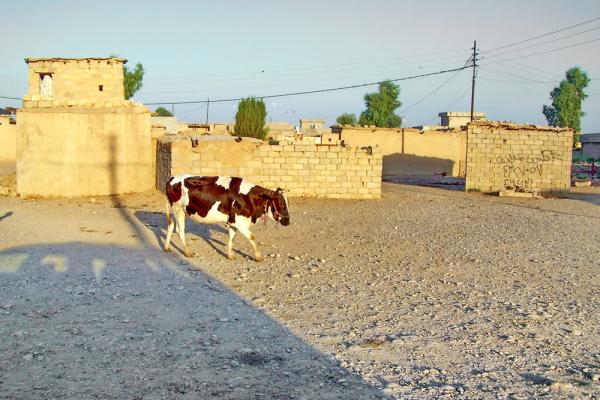It is hard to put my feelings into words. I am travelling as a peace witness in Iraqi Kurdistan. Just the other day we visited a sheikh I met in Fallujah in 2012. He and his family were forced to flee to Kurdistan nearly two years ago — Fallujah is being held by ISIS, and none of its residents are allowed to leave. People are dying of starvation.
He and I met a few days ago in the rented apartment of another sheikh, who also fled Fallujah with his family. Although our host was sick with cancer, he welcomed us warmly. The afternoon was balmy, the room airy and light, with cushions on the floor, a couple of plastic chairs, and a bed that also served as a sofa. Water was fetched immediately, and we were graciously served sweets and tea.
Outwardly everything seemed so normal that at first I forgot I was with people who are among the now-hundreds of thousands of people internally displaced in Iraq. But in the next few hours, we would hear many tragic stories that would dispel any thought of normalcy.
“We have lost everything,” our sheikh friend said.
“We are like babies just being born. We’ve lost schools, universities, houses, bridges, hospitals, markets. All gone. People in the U.S. need to know what their government did to the Iraqi people. All this pain, destruction, and hurt.”
After a lengthy open discussion, we were invited to join the sheikh’s wife, watching children with other women of the family in a second room. Again, a very warm welcome belied an all-too-grim reality.
This dear woman’s mother, sister, and daughter are all currently trapped in Fallujah, with ten children in their collective care. On occasion she is able to reach them by phone. The women in Fallujah weep to her across the line that they are reduced to eating grass.
“We can do nothing to save them!” the sheikh’s wife said.
“The government doesn’t help! We don’t know how this is possible!”
It was incomprehensible to me — I find myself simply unable to imagine this family’s pain.
“We have a saying,” she said. “People far away from the fire, don’t get burned. They don’t feel the heat.”
Across that phone line, waiting for the next call, she feels it.
As we stood to take our leave, we embraced and kissed one another. One by one, I took their sweet faces into my hands. They thanked us for the visit. Photos were taken to remember each other by, and I recorded all of the names of their loved ones in Fallujah so they will not be forgotten.
Yesterday morning, my driver and I left for Dahook, about three hours northwest of Erbil. The family that was to host me in Dahook are Christians from the same village as my driver. They lost a house to ISIS in Mosel in 2008 and fled, after priests were murdered in their church, to a village called Teleskuf, where they would live for another six years — until ISIS took that village, as well.
How to respond to such pain? With action. Seated with others, in an unfinished building we visited in Dahook, was a young Yazidi man who is studying in the university. He plans to reach out to about 5,000 children on the mountain with hopes of educating them. I shared the story of my friends, the Afghan Peace Volunteers in Kabul, and the fruits they are reaping from their literacy program with street children.
It’s hard to put my feelings into words. "People far from the fire don't feel the heat,” and here in Kurdistan I find myself feeling the heat of the fire.
“What can we do?,” ask my hosts. “We want a future for our children.”
Got something to say about what you're reading? We value your feedback!
